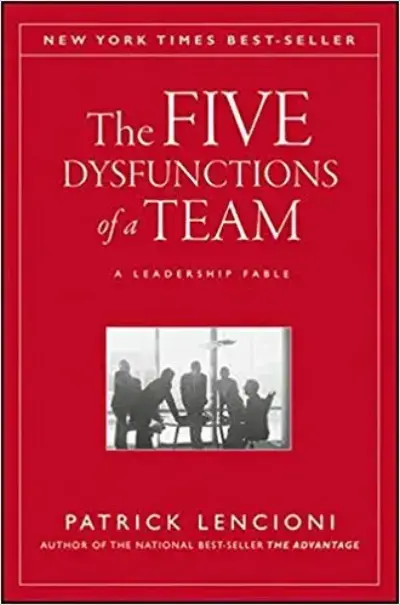Book Summary
The Five Dysfunctions of a Team by Patrick Lencioni
4 minutes read

An overview of the model
The first dysfunction is an absence of trust among team members. Essentially, this stems from their unwillingness to be vulnerable within the group. Team members who are not genuinely open with one another about their mistakes and weaknesses make it impossible to build a foundation for trust.
This failure to build trust is damaging because it sets the tone for the second dysfunction: fear of conflict. Teams that lack trust are incapable of engaging in unfiltered and passionate debate of ideas. Instead, they resort to veiled discussions and guarded comments.
A lack of healthy conflict is a problem because it ensures the third dysfunction of a team: lack of commitment. Without having aired their opinions in the course of passionate and open debate, team members rarely, if ever, buy in and commit to decisions, though they may feign agreement during meetings.
Because of this lack of real commitment and buy-in, team members develop an avoidance of accountability, the fourth dysfunction. Without committing to a clear plan of action, event the most focused and driven people often hesitate to call their peers on actions and behaviors that seem counterproductive to the good of the team.
Failure to hold one another accountable creates and environment where the fifth dysfunction can thrive. Inattention to results occurs when team members put their individual needs(such as ego, career development, or recognition) or even the needs of their divisions above the collective goals of the team.
Dysfunction 1: Absence of trust
Trust lies at the heart of a functioning, cohesive team. Without it, teamwork is all but impossible.
Teammates must get comfortable being vulnerable with one another.
Team leaders must create an environment that does not punish vulnerability.
By building trust, a team makes conflict possible because team members do not hesitate to engage in passionate and sometimes emotional debate, knowing that they will not be punished for saying something that might otherwise be interpreted as destructive or critical.
Dysfunction 2: Fear of Conflict
It is important to distinguish productive ideological conflict from destructive fighting and interpersonal politics. Ideological conflict is limited to concepts and ideas, and ovoids personality-focused, mean-spirited attacks.
Teams that avoid ideological conflicts often do so in order to avoid hurting team members’ feelings, and then end up encouraging dangerous tension.
Those that avoid conflict actually doom themselves to revisiting issues again and again without resolution.
As long as some team members believe that conflicts is unnecessary, there is little chance that it will occur.
It is key that leaders demonstrate restraint when people engage in conflict, and allow resolution to occur naturally, as messy as it can sometimes be.
By engaging in productive conflict and tapping into team members’ perspectives and opinions, a team can confidently commit and buy in to a decision knowing that they have benefited from everyone’s ideas.
Dysfunction 3: Lack of Commitment
The two greatest causes of the lack of commitment are the desire for consensus and the need for certainty.
In many cases, teams have all the information they need, but it resides within the hearts and minds of the team itself and must be extracted through unfiltered debate.
One of the greatest consequences for an executive team that does not commit to clear decisions is unresolvable discord deeper in the organization.
More than any other member of the team, the leader must be comfortable with the prospect of making a decision that ultimately turns out to be wrong.
In order for teammates to call each other on their behaviors and actions, they must have a clear sense of what is expected.
Dysfunction 4: Avoidance of Accountability
In the context of teamwork, accountability refers specifically to the willingness of team members to call their peers on performance or behaviors that might hurt the team.
Members of great teams improve their relationships by holding one another accountable, thus demonstrating that they respect each other and have high expectations for one another’s performance.
The most effective means of maintaining high standards of performance on a team is peer pressure.
It must be clear to all team members that accountability has not been relegated to a consensus approach, but merely to a shared team responsibility, and that the leader to the team will not hesitate to step in when it is necessary.
An absence of accountability is an invitation to team members to shift their attention to areas other than collective results.
Dysfunction 5: Inattention to Results
An unrelenting focus on specific objectives and clearly defined outcomes is a requirement for any team that judges itself on performance.
Every good organization specifies what it plans to achieve in a given period, and these goals, more that the financial metrics that they drive, make up the majority of near-term, controllable results.
Team leaders must be selfless and objective, and reserve rewards and recognition for those who make real contributions to the achievement for group goals.